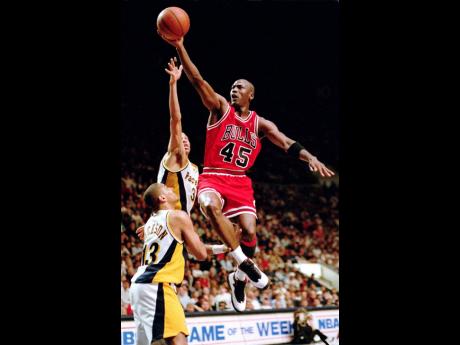Tanya Lee | Jordan wasn’t perfect
When I watched ‘The Last Dance,’ a documentary on ESPN and Netflix, like the rest of the world, it was evident that Michael Jordan personifies greatness and solidified that ‘90s basketball, the basketball I grew up watching, was the most exciting era of the sport.
It was a time when then league commissioner David Stern revolutionised the game and cable television became global, allowing fans to see the best of American sports.
American sports are driven by a phenomenal marketing machinery and pushed by shoe companies, leagues, and television stations seeking to sensationalise anything that brings economic gain.
Ad Weekly counted over 100 shots of Nike’s famous swoosh during one episode of ‘The Last Dance’.
As the series progressed, I became increasingly uncomfortable with some of what I consider the fabricated portrayals. American sports, in an attempt to create a godlike figure out of mere mortals, strikes again.
To understand the true nature of Michael Jordan and the fabricated stories, one has to go back to 1989.
In 1989, the NBA, aiming to get basketball in the minds of young fans, produced a best-selling Jordan documentary called ‘Come Fly With Me’. At the time, VHS tapes were immensely popular among pre-teens, and the hope was that Jordan, the young face of the league, would rival Disney films on the VHS shelves.
That ‘documentary’ tells a fabricated story of a young Jordan cut from his high school basketball team. Five minutes in enters a rural black man named Fred Lynch, who smiles at the camera, professing to be Jordan’s high-school coach who cut him from the team. The problem is that Jordan was never cut from any team, Lynch never met Michael Jordan, and he wasn’t coaching at Laney High in 1978. Fred Lynch would later say that he had been coerced to pretend to be Jordan’s coach.
The actual coach, Pop Herring, said in an article in Sports Illustrated magazine in 2012 that Mike, then 5’10”, tried out for the sophomore team and made it. The senior team roster did not include sophomores, with one exception. Pop’s senior players were short, so the coach unprecedently included a 6’7” sophomore named Leroy Smith on the senior team.
The story is that Jordan, seeing his friend Smith on the senior list, became enraged with jealousy and took it personally. He proceeded to use that as motivation right through high school and his NBA career. Even in his hall of fame speech, he repeated the tall tale of being “cut from the team”.
No surprise to anyone. Jordan had a history of perceiving slights to fuel his inner drive. The NBA, seemingly, didn’t care to fact check, which is unethical in the context of a “documentary”.
A documentary is a film that provides a factual report on a particular subject. It is a non-fictional account primarily done to maintain a historical record. Typically, subjects are not included in the editing process. Doing that compromises history and misinforms the generation of fans not old enough or even alive at the time.
‘The Last Dance’ gave Jordan production rights as the final authority. It includes scores of questionable “facts” that have left his teammates befuddled, and Scottie Pippen, his trusted wingman without whom the Bulls could not have won six championships, reportedly upset.
The series showed General Manager (GM) Jerry Krause being constantly mocked by his players. What it doesn’t tell you is Krause’s immense contribution to those six championships through his legendary scouting skills. Krause, now deceased, was probably the best GM in basketball history, responsible for assembling the role-players and the masterly coach Phil Jackson.
Michael the leader
The series positions Michael as an inspirational leader who brought out the best out in his teammates. Numerous prior interviews and teammate biographies detail Jordan’s toxic and abusive leadership style.
He occasionally broke his teammates’ morale through bullying and even got into fights, reportedly sometimes if he thought someone had shown him up in practice. Derogatory nicknames, withholding food if they didn’t meet his standards, and other bizarre tactics show a less-than-ideal role model.
Jordan reportedly was so consumed by the need to win that teammates would sometimes feel “relief” rather than exhilaration after a championship. B.J. Armstrong shared as much in the series.
Michael the gambler
Jordan’s compulsive gambling problem was vaguely addressed. His alleged illegal habit was as sordid as the murky swamp waters over which they found the body of James Jordan in 1993. The elder Jordan, strangely, was reported missing all of three weeks after his disappearance, further fuelling rumours that it may have been connected to his son’s gambling habits.
The NBA had an ongoing investigation around Jordan and his ties to illegal gambling, and, by extension, the criminal underworld. This, conspicuously, coincided with his decision to retire, after which the NBA dropped the investigation.
Many fans couldn’t make sense of why the most competitive human being on the planet, at the height of his career, would walk away from the love of his life at a time when he probably needed basketball the most.
The far-reaching effects of his gambling are heavily documented with even an underage Marcus Jordan, Michael’s youngest son. It prompted an investigation after the 19-year-old dropped over US$50,000 while gambling in Las Vegas in 2010.
Jordan once said, “I’ve gotten myself into situations where I would not walk away, and I’ve pushed the envelope. Is that compulsive? If you’re willing to jeopardise your livelihood and your family, then yeah.”
We never saw any real account of Jordan the husband, the dad, the social activist. For many, the greatest basketballer that ever played may have painted an image of a black Jesus on the court, but as with most other sports heroes, not everything about Jordan is worth celebrating.
Tanya Lee has over 10 years’ expertise as a Caribbean sports marketer and is also an athlete manager and publicist.

